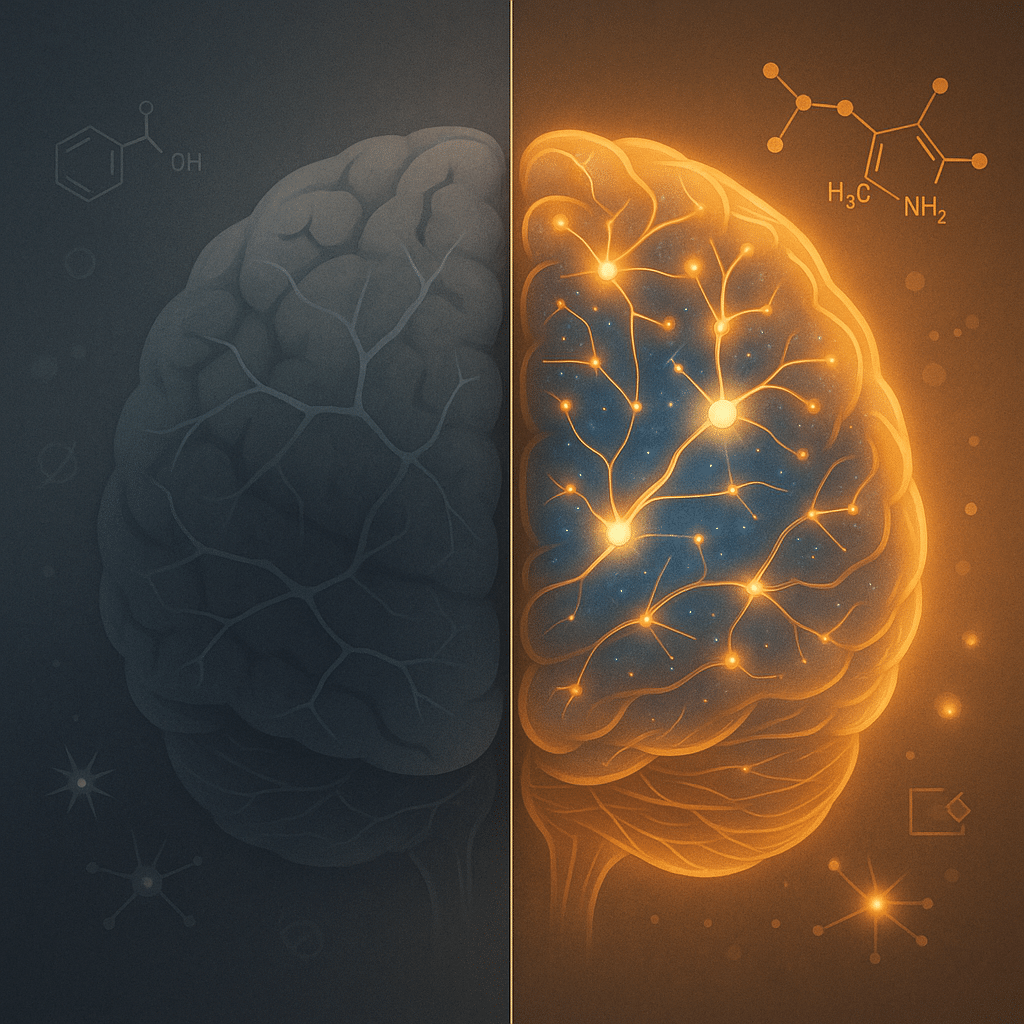The Hidden Cognitive Cost of Disrupted Melatonin: Why Your Brain’s Night Shift Matters More Than You Think

Ever find yourself staring at a computer screen at 2 AM, trying to remember a colleague’s name you’ve known for years?
The harder I tried, the more it slipped away—like trying to grab water with my bare hands.
That moment of cognitive fog wasn’t just about being tired. It was my brain’s way of sending an SOS signal that I’d been ignoring for months.
What I didn’t realize then was that my disrupted sleep wasn’t just making me tired—it was systematically dismantling my cognitive abilities from the inside out. The culprit?
A disrupted melatonin system that most of us unknowingly sabotage every single day.
The Night Shift Your Brain Desperately Needs
Most people think of melatonin as simply a sleep aid, something you pop when you can’t fall asleep. But here’s what fascinates me after years of research and personal experimentation: melatonin is actually your brain’s master conductor, orchestrating a complex symphony of cognitive restoration that happens exclusively during sleep.
When I first started selling dietary supplements, I thought I was just helping people sleep better. (Which I was.) What I subsequently discovered was that I was actually helping them think better, remember better, and function better during their waking hours. The cognitive benefits weren’t a side effect—they were the main event.
Recent research from 2024 has revealed something remarkable: melatonin MT1 receptors directly affect neurons that synthesize noradrenaline in the brain’s “blue spot” (Locus Coeruleus), which is crucial for REM sleep and memory consolidation. This isn’t just about getting drowsy—it’s about your brain’s ability to process, consolidate, and retrieve memories.
What Really Happens When Melatonin Goes Dark
Here’s what both science and personal experience says about what goes wrong when your melatonin system fails. It’s not just about counting sheep—it’s about your brain’s inability to perform its most critical maintenance work.
The Memory Assembly Line Breaks Down
Think of your brain during sleep as a massive factory with multiple assembly lines running simultaneously. During deep sleep, your brain is:
- Consolidating memories from short-term to long-term storage
- Clearing metabolic waste through the glymphatic system
- Strengthening neural connections that support learning
- Pruning unnecessary neural pathways to optimize performance
When melatonin production is disrupted—whether from blue light exposure, irregular sleep schedules, or age-related decline—this entire factory goes offline. Recent studies show melatonin acts as a robust antioxidant with potential effects on amyloid-beta and pathologic tau burden, the hallmarks of Alzheimer’s disease.
The Cognitive Cascade Effect
Here’s where it gets personal. During sleep struggles, there is usually a predictable pattern:
- Day 1-2: Slight mental fog, increased caffeine needs
- Day 3-5: Difficulty with complex problem-solving, emotional regulation issues
- Day 7+: Memory lapses, creative blocks, decision-making paralysis
This wasn’t just fatigue—it was cognitive architecture collapsing. New research shows that melatonin helps ameliorate cognitive decline by improving neuroinflammation and synaptic plasticity, particularly in conditions like sleep apnea where intermittent hypoxia damages cognitive function.
The Shift Worker’s Cognitive Crisis
Antonia is a nurse who works rotating shifts. She realised she had a probem after making a medication error that could have been serious—not because she was careless, but because her cognitive function was compromised by chronically disrupted melatonin production.
A 2024 clinical trial found that melatonin supplementation significantly improved occupational cognitive performance in shift workers with low sleep quality. But here’s what the study didn’t capture: the emotional toll of knowing your mind isn’t working at full capacity when people depend on you.
Antonia’s experience illustrates a broader issue. About one-third of workers have irregular schedules, putting them at risk for sleep disorders that directly impact cognitive performance. The solution isn’t just better sleep—it’s understanding how to support your brain’s natural melatonin rhythm even when your schedule works against it.
Beyond Sleep: Melatonin’s Direct Cognitive Benefits
This is where the conversation usually takes an unexpected turn. While researching for my customers, I discovered that melatonin’s cognitive benefits extend far beyond just improving sleep quality. Let me break down what recent research reveals:
Neuroprotection and Brain Aging
Studies now show that melatonin has far-reaching effects on various physiological systems, including immunity, cardiovascular function, antioxidant defense, and lipid homeostasis. But what caught my attention was its role in protecting against age-related cognitive decline.
Most people have watched family members struggle with memory issues. The research suggests that maintaining healthy melatonin levels throughout life may be one of our best defenses against cognitive aging. It’s not just about sleeping better tonight—it’s about protecting your cognitive future.
The Synaptic Plasticity Connection
Here’s where it gets really interesting. Recent studies show that melatonin can attenuate memory encoding deficits through hippocampal synapse regulation, particularly by alleviating excessive autophagy induced by chronic sleep deprivation.
In simple terms? Melatonin helps your brain maintain the flexibility to form new neural connections—the very foundation of learning and memory. When I learned this, it completely changed how I viewed melatonin supplementation. We’re not just addressing sleep problems; we’re supporting the brain’s fundamental ability to adapt and learn.
The Practical Reality: What I’ve Learned About Optimization
After years of personal experimentation and customer feedback, here’s what I’ve discovered about optimizing melatonin for cognitive benefits:
Timing Is Everything
The when matters as much as the what. I’ve found that taking melatonin 2-3 hours before intended sleep allows for optimal cognitive restoration. This isn’t just about falling asleep—it’s about giving your brain sufficient time to enter the deeper sleep stages where memory consolidation occurs.
Dosage Paradox
Here’s something that surprised me: more isn’t always better. Research shows that melatonin administration at a dose of 1 mg nightly may be effective in improving certain aspects of cognitive functioning and subjective reports of sleep quality in elderly subjects. Many people start with 5-10mg, but I’ve seen better cognitive results with lower, more physiological doses.
The Environmental Factor
This might be the most important insight: melatonin supplementation works best when combined with optimizing your natural production. That means:
- Dim lighting 2 hours before bed to support natural melatonin release
- Morning light exposure to maintain circadian rhythm
- Consistent sleep schedule even on weekends
- Temperature regulation (cooler rooms support better melatonin function)
The Questions That Keep Me Up at Night (Ironically)
Despite all this research, I still grapple with some fundamental questions about melatonin and cognitive function:
Are we treating symptoms or causes? While melatonin supplementation clearly helps, I wonder if we’re addressing the root issues that disrupt our natural production in the first place. The blue light exposure, the 24/7 connectivity, the chronic stress—these are the real culprits behind our cognitive sleep crisis.
What about long-term dependence? I’ve had customers worry about becoming dependent on melatonin supplements. The research suggests this isn’t a concern with proper dosing, but it raises important questions about supporting natural production versus supplementing indefinitely.
The Alzheimer’s Connection: A Personal Wake-Up Call
My buddy Dave recently lost his mother-in-law to Alzheimer’s. It was a long, slow, unpleasant decline, for everyone involved. Suddenly, all the research on cognitive protection became intensely personal to him and his wife.
Studies are now exploring melatonin’s potential in both preventive and therapeutic capacities for Alzheimer’s disease, given its effects on amyloid-beta and tau pathology.
Here’s what I’ve learned about the importance of sleep and melatonin for cognitive health. The best time to protect your brain is before you need protection. This isn’t about fear—it’s about empowerment through understanding.
Moving Forward: A Different Conversation
As I reflect on this journey from sleepless nights to cognitive clarity, I realize we need to reframe how we think about melatonin. This isn’t just about sleep disorders—it’s about cognitive optimization, brain health, and quality of life.
What would happen if we approached melatonin supplementation not as a sleep aid, but as cognitive support? How might that change our dosing strategies, our timing protocols, our combination approaches?
The Road Ahead: Questions for You
I’m curious about your experience. Have you noticed cognitive changes with improved sleep? Do you feel sharper, more creative, better able to handle complex problems when your sleep is optimized?
These aren’t just academic questions—they’re the foundation of how we can better support brain health in an increasingly sleep-disrupted world. The research is clear: sleep and corresponding brain activity are of central importance for memory consolidation. But the personal application is where the real magic happens.
As someone who’s navigated the transition from cognitive fog to clarity, I believe the most important conversation isn’t about whether melatonin works—it’s about how we can optimize our brain’s natural restoration processes for long-term cognitive health.
What’s your experience been with sleep, cognitive function, and melatonin? I’d love to hear your story and learn from your insights. After all, we’re all in this together, trying to optimize our brains for the complex world we live in.
The night shift your brain desperately needs isn’t just about rest—it’s about cognitive renaissance. And melatonin might just be the key to unlocking it.

